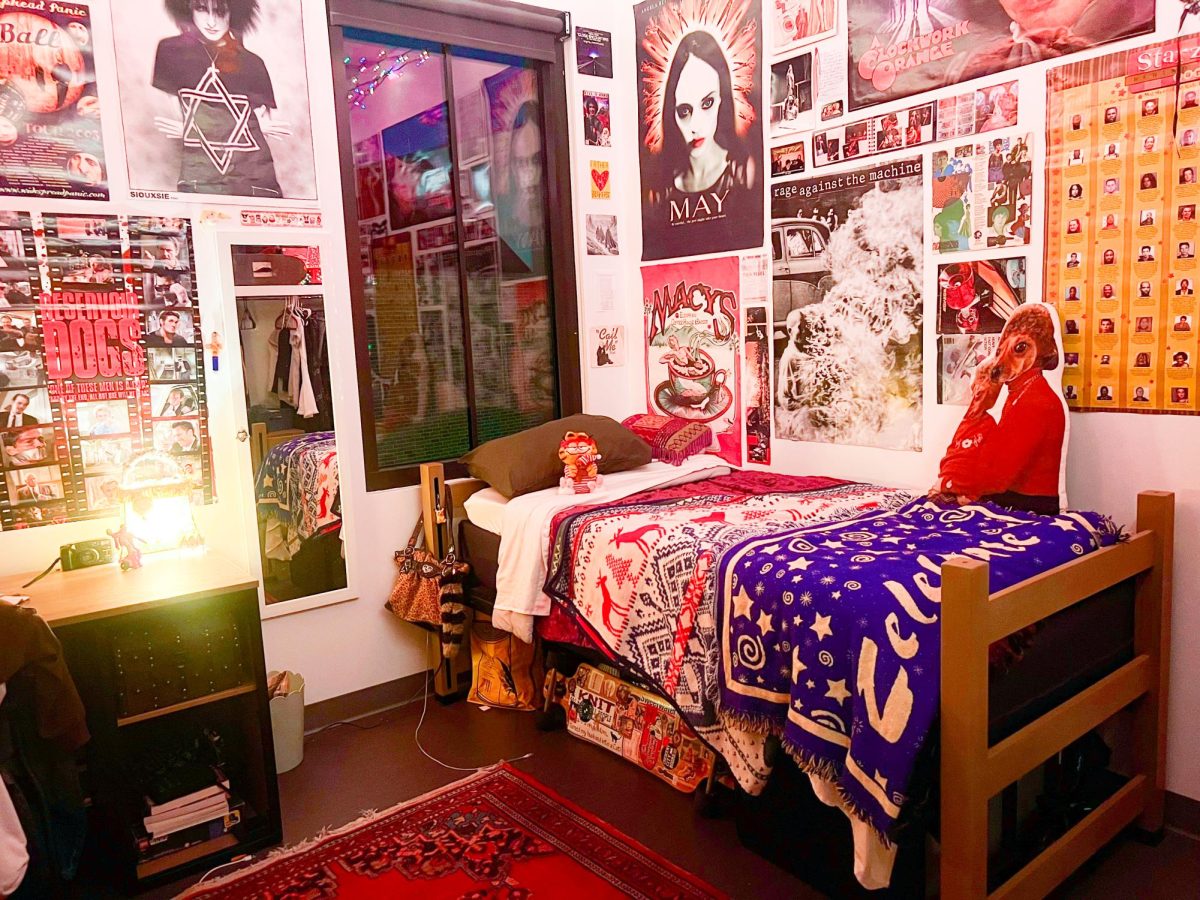Editor’s Note: This interview was conducted in French and translated into English for the benefit of the reader.
The Broadside music venue was the scene of a sensational concert by one of the greatest living guitarists, the Nigerien (not Nigerian) Omara Moctar, better known as Bombino. On a memorable Saturday evening, Sept. 16, the city’s music scene came alive as Bombino and his band graced the stage, drawing a crowd that stretched out the venue’s doors. The Broadside itself, a newcomer since 2020, is rapidly growing into a local favorite, sitting just across the street from the historic Broad Theatre. The Maroon got an exclusive interview with Bombino and his band during their one-night stop in New Orleans – at the beginning of their two-month tour across the globe.
Bombino, born in Niger and belonging to the Tuareg ethnic group, is widely regarded as one of the world’s most talented guitarists. The Tuareg people, known for their nomadic pastoralist lifestyle in the challenging Saharan and Sahelian deserts and mountains of West Africa, are often recognized by their iconic blue indigo dyed clothing and their storied reputation as formidable warriors. Often romanticized, the Tuareg people live and move freely through a desert that is divided among more than twelve countries, and feel at home in a place that is often misunderstood and thought of as lifeless.
Political events of the last several decades, and now the past few months, have highlighted the poverty and violence in this Saharan land, which many see as a barrier, and the Tuaregs see as backroads connecting communities. Bombino’s life journey has been remarkable. He evolved from a rebellious young child who skipped school, and was at the throes of political instability that caused his family to often move, to become an internationally acclaimed artist, due to his passion for the guitar.
His music, often described as a captivating fusion of traditional Berber rhythms, rock and roll, and blues, known as Tishoumaren or Desert Blues, serves as a powerful call for both peace and the preservation of Tuareg culture. Bombino has since earned taglines like “The World’s Best Guitarist” and “The Sultan of Shred,” for his unparalleled ability to seamlessly meld sound and soul, solidifying his status as an icon in the world of music. Rolling Stone has described his innovations as “Tuareggae.”
The Broadside was transformed from an old scrap yard only a few years ago. The stage sits outside and looks out into an open lot of Adirondack chairs and fine gravel. The concert was opened by an innovative French-speaking Louisiana band, Louis Michot, with whom Bombino has recorded in the past. The Nigeriens took the stage a little after 9 p.m. to a diverse array of concertgoers, from old hippies to young enthusiasts alike, all converging to witness Bombino’s virtuosity.
The band is composed of Bombino, Mauritanian Youba Dia on bass guitar, fellow Nigerien Kawisan Mohamed on rhythm guitar and vocals, and Corey Wilhelm from Vermont on drums. They have played together for many years and do not rehearse, instead following one another through the repertoire. Bombino opened the set with melodic and soft acoustic songs, with his band in the background, focusing the attention of the large audience. Then, in a beautiful shock, Corey Wilhelm moved from the traditional African hand drums to his full drum kit and kicked off a rollicking jam.
Dia punctuated in between the tunes with commentary in somewhat imaginative English, receiving cheers and laughter as his bandmates beamed. The band plays in traditional clothing, to convey, they said, a reminder to the world of where this music originates and its often-forgotten cultural roots. The show was a smash, and received two roaring encores, with a large crowd remaining after to buy albums, talk, and take pictures with the friendly band.
The Maroon got to spend time with Bombino and his band members, before and after the show. We began with the good fortune of making contact with Bombino through mutual friends in Niger. Upon arrival, venue management appeared somewhat dubious and uncooperative, but Bombino’s gracious demeanor prevailed. He personally ushered the Maroon staff backstage, giving a behind-the-scenes glimpse into the world of this desert marvel.
Bombino’s band was quick to get up and offer away their chairs as our staff arrived, typical of their cultural hospitality, choosing instead to sit on the floor.
And an hour before he took the stage, Bombino exuded an air of tranquility as he layed back on a plastic mat to take a nap, despite the bustling chaos unfolding all around him, reminiscent of the daily rhythms of life in Niger.
In our interview, Bombino elaborated on the importance of preserving the culture of the nomadic people of the Sahara. Much like his own music, Tuareg culture emphasizes a strong sense of identity and pride in their rich history. Bombino discussed his efforts to promote education and the valuable lessons he believes younger generations can glean from preserving their heritage.
“When we get up on stage to perform in our traditional clothing, that is to preserve our heritage, that’s to show our traditions to the United States, from where we’ve come – and that’s very important to me. With music, we always hope to ‘push further,’” he said.
Through music, Bombino and his band aim to bridge cultural divides, ensuring that the vibrant tapestry of Tuareg heritage continues to thrive. He firmly believes that through education, individuals can build a stronger connection to their roots and ultimately foster a deeper appreciation for their cultural legacy. “Education is the foundation, fundamental to everything,” he remarked.
According to Bombino, education transcends the confines of traditional schooling; it’s a process of immersing oneself in the unfamiliar and expanding one’s horizons. He underscored that true education encompasses not only formal learning but also the journey of self-discovery, where individuals gain wisdom and understanding that goes beyond their origins.
“Education is to expose yourself to the unfamiliar, beyond where you’re from – it’s not just going to school, it’s there getting out and really within yourself that you are educated, as such,” Bombino said.
Bombino went on to emphasize the pressing issue of the Tuareg people being dispersed across numerous countries, including Libya, Algeria, Niger, Mali, and Burkina Faso. He underscored that his band’s music serves as a powerful tool for preserving their sense of self and their cultural identity amidst this dispersion.
When asked about his hopes for people’s reactions to his music on this tour, Bombino said that while Tuareg music in the US has been progressively gaining recognition, it is essential to clarify the intent and message behind his music as a medium of self-expression and cultural representation.
He said that through music, even if individuals don’t share a common language, their hearts can connect, resonating with the emotions and sentiments embedded in the melodies. For Bombino, the unifying force of music transcends linguistic boundaries, fostering a deep and shared understanding among all who lend their ears to the harmonious sounds he creates.
Bombino’s influence extends far beyond his musical prowess; he is also a dedicated advocate for equal rights and education within his community. His commitment to the well-being of his people mirrors the same passion he brings to his distinctive musical beats. As a result he has been compared to legendary guitarists like Jimi Hendrix and Carlos Santana, for being both a remarkable artist and activist for his community’s welfare.
For Bombino and many artists who are working to preserve their culture, they must balance a creative tension between preserving heritage and tradition, and innovating it. For instance this genre of “Desert Blues”’ has only been around since the 1980s. Bombino said they must maintain the delicate equilibrium between tradition and innovation, emphasizing their objective to continue evolving as artists while remaining true to the style of his homeland, striking that harmonious balance, and ensuring that people keep listening to their music and messages.
Ultimately, New Orleans attracts these high quality – if less-than-mega-commercial artists because it appreciates art, authenticity, and quality, and embraces the unusual and intriguing. Our city benefits from rich contributions of artists like Bombino who contribute to our quality of life, and strengthen the endless struggle to preserve – and simultaneously create – our own rich cultural tapestry.


















